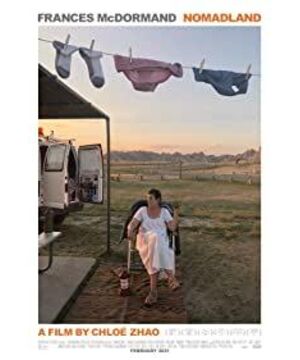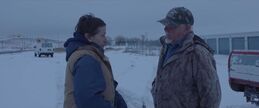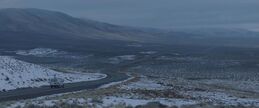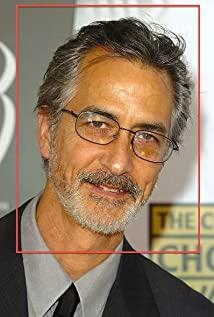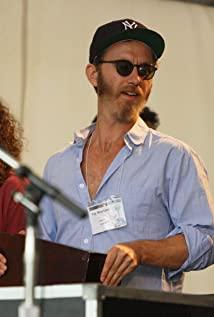Fern (the protagonist of the film) ignites the sparks that crackle and shake in the dark night at the campsite. The "Happy New Year" greeting goes unanswered, and the next scene switches to the wasteland scene of the driver looking out from the car. The day of "Happy New Year" was originally a day for friends and family to reunite. In this scene near the end of the film, on the campsite, the doors of many RVs are open, and the cars seem to be empty. Where have people gone? The orange flames of the little fireworks flickered, and only Fern, who was wishing the New Year in the silent night, was alone.
The third song of "The Divine Comedy: Hell", lines 55-57: "Such a long line / I would never have believed before / Death killed so many people."
Few human footprints, the empty wasteland constitutes a large number of exterior scenes traversed by the protagonist's journey in the film. People stand alone in the wasteland, and all the voices of life that are in contact with the surrounding can only be heard by others and have the opportunity to speak to others only in the space closest to themselves. If the camera, which is another witness, hadn't walked over and approached these tiny voices, then driving on the road, the sound of the tire tracks was as silent as the wind blowing the desert, and the campfires where the campers talked with their hearts disappeared into the bustling city. In the midst of the noise, those wild scenes with huge contrasts have never been presented so closely to the audience. The camera conveys the brightness of the little sparks in the wilderness, and the true inner life of every "on the road" in the film when they experience the wilderness. .
The sound of life is partial and silent to one's confines, the panorama of the wasteland is equally silent, yet open to everyone, Fern on the wasteland, her heartbeat, her voice, her What is to be done is so subtle that it can be ignored as a vanishing point on the visual level in the vast field, and it is almost impossible to be heard by people who are far away from it, which is incomprehensible to those who have not experienced it. At certain moments, the background music is very loud and fills the pictures of these people juxtaposed with the wasteland. The fingers press the keys, and the people play the piano. At this time, the wasteland finally has a rhythmic echo.
The fourth song of "The Divine Comedy: Hell", lines 25-27: "Here, no mournful cries enter / our ears, only sighs / make the eternal air tremble."
Fern drove alone, and as long as he was still on the road, the borders of the wasteland stretched without end, and the far side of the road and every point reached was still part of the vast wasteland. The direction of Fern's progress does not point to a certain corner of the wasteland. Her purpose is not to leave, but to endure. Silence is the limitation of the wasteland, and at the same time it also makes man. When people are in it, the loudest voice comes from the heart, and the thoughts pouring out of memory weave this journey. As the story progresses, the camera gradually penetrates into the depths of the protagonist and the people who meet her. Those wounds that cannot be relieved, the place where the car is located is the inner world where the protagonist has lost everything important.
("Not everyone can leave everything and hit the road" (one of the family), "That's how you see me" (Fern))
Instead of leaving everything behind, Fern lost everything that was important. No one can comfort her wounds, and there are few people who can understand her and empathize with her. Wherever you go, houes and deceased husbands, those important people and things will never come back. Fern's words "Happy New Year" in the campground in the wasteland could not get a response from the people she cherished in her heart. The house was empty, and the former home was empty. All that awaited her was the silence of the deceased and the desolate silence. As if the boundless wasteland swallowed up all the echoes, the voices of the living could not find their place here, nor did they reflect.
Perhaps it is only by tracing back from the end of the film that we can understand the starting point of the protagonist's journey, that is, the starting point of the wasteland, the house where the deceased husband once lived, and the beginning of the main image of the film.
("One of the same houses...but it's actually very special, we happened to be on the edge of the town, and our backyard looked extremely open, all desert, desert, desert, extending to the foot of the mountain, all the way None.")
She stayed in Empire for a long time due to the death of her husband, and the belongings of the house and garage became her sanctuary, and it was these memories that haunted her that she could not forget.
("I won't take off (the ring)") ("It's cost me a lot of time and money in and out, a lot of people don't understand the point of doing this, but it's not, where do I live, there is my home (car)")
At the end of the film, Fern seems to be revisiting the old place, returning to the house that used to be home, nothing has changed, the house is still empty, home is not home, she opens the door to the backyard, goes through the fence, into the wasteland, the car again Hit the road. At the end of the film, we came to the starting point of Fern's heart, that is, the wilderness journey she drove to was covered with the silent voice of the wasteland. The inner desolation that Fern has endured all alone has found its reason.
"The Waste Land" - Eliot
"Yes, I myself saw Sybyl of Gummi hanging in a cage. The children were asking her: Sybyl, what do you want, and she replied, I'm going to die." (Dedicated to Ezra Pound Most Outstanding artisan)
("For those who have to hit the road, we'll see you on the road" (end credit))
People set off, met briefly, stayed briefly, hurt, but kept on going.
(“There are many of our peers on this road. Everyone is in pain, and many people have not come out. It’s okay, it’s okay. The thing that attracts me most about this kind of life is that there will be no goodbyes. I met hundreds of people on the road, I never said goodbye, I always said, we will see you on the road, and we do meet, and we meet again after a month, a year, sometimes years. I hope Going forward, confident in my heart that I will see my son again, and you will see Bo again." (Bob))
View more about Nomadland reviews


